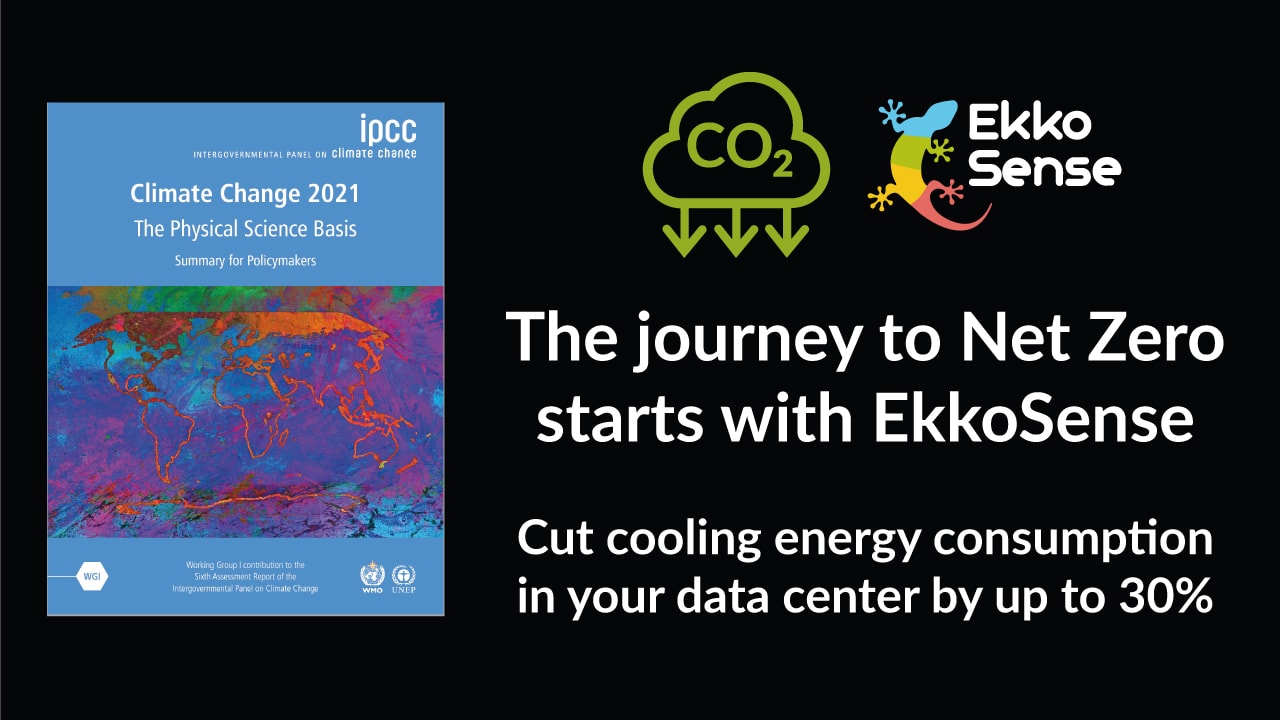Data centre sustainability. Data centres need to move faster if they’re serious about carbon reduction

The latest Intergovernmental Panel on Climate Change (IPCC) Report released last month described the state of climate change as ‘widespread, rapid and intensifying’. The report suggests that ‘unless there are immediate, rapid and large-scale reductions in greenhouse gas emissions’ then limiting global warming to close to 1.5°C or even 2°C will be beyond reach. Can data centre sustainability make an impact here?
So the message from the IPCC is loud and clear – climate change is intensifying, and intervention is urgently needed. It’s therefore surprising that the data centre sector – already established as one of the world’s highest collective consumers of energy – is still overlooking opportunities to reduce energy consumption!
When EkkoSense conducted research analysing the actual cooling performance within live data centres earlier this year, we found that many data centre operators are missing out on proven ways of cutting cooling energy consumption by up to 30%. Our results also showed that average data centre cooling utilisation levels still sit at around 40% – meaning that most organisations are not even using over half of their cooling capacity.
The good news is that there’s a real opportunity for organisations to achieve significant carbon reductions with the latest software-driven data centre optimisation solutions. Indeed, EkkoSense’s in-depth analysis shows that it’s now possible to secure cooling energy consumption reductions of around a third simply by following current data centre thermal optimisation best practices.
Our research also identified that implementing an effective thermal optimisation programme has collectively secured a cumulative 10MW+ cooling power saving – equivalent to a minimum $10 million cooling energy cost saving since we first deployed our EkkoSoft Critical solution. In carbon terms, this equates to a cumulative saving of around 20,000 tonnes CO2eq emissions reduction.
This level of performance optimisation applied to the global estate of around 22,5000 mid-size, enterprise and larger hyperscale data centers suggests that potential worldwide cooling energy savings of over $1.7 billion are quickly realisable! Additionally, an overall carbon emissions reduction of some 3.38 million tonnes CO2 -eq worldwide can be secured simply by applying the systematic and synchronised application of data center cooling optimisation best practices on a global basis.
One organisation that recognises the importance of data centre sustainability and optimising data centre cooling is O2, who recently became the first major mobile network operator to roll out new EkkoSense management software across its entire estate. The software uses smart sensors fitted to data centre equipment to monitor exactly how much cooling each site needs at any one time, and report back on how to optimise cooling as demand changes. This not only helps make sure each site operates as efficiently as possible, but it also helps identify any issues and prevents overcooling or overheating. O2 expects the EkkoSense software to deliver energy savings equivalent to one million kilograms of CO2 year-on-year.
O2 is focused on using its data centre energy in a smarter way, and is focused on hitting its efficiency targets as it heads towards net zero by 2025, but without compromising the service the business provides.
At EkkoSense we recognise that it can be challenging to cool data centres more efficiently and deliver energy savings – particularly at a time when demands on critical facilities have never been so intense. However, given the immediacy of the latest IPCC report and the knowledge that midsize, enterprise and hyperscale data centres are currently overlooking a potential worldwide carbon emissions reduction of over 3.3m tonnes of CO2-eq. per year, our industry needs to start accelerating its net zero journeys.
Learn more about how organisations are still missing out on proven ways to cut their data centre cooling energy usage in our 2021 Net Zero whitepaper, available here, or get in touch to discuss your carbon reduction journey.